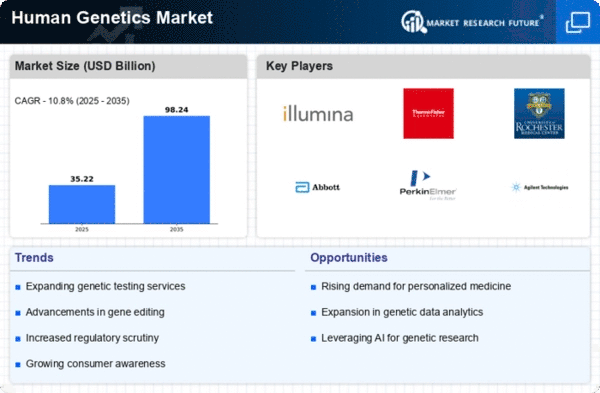Market Share
Human Genetics Market Share Analysis
A genetic disease refers to any illness resulting from an anomaly in an individual's genetic makeup, and these conditions play a significant role in causing disability, death, and emotional distress. Moreover, genetic disorders are a leading cause of pregnancy loss, particularly in developed nations like Spain, Switzerland, Germany, and others, where chromosomally defective fetuses account for nearly half of spontaneous abortions. In developed countries, genetic disorders contribute to approximately 30% of postnatal infant mortality. The escalating occurrences of genetic diseases and cancer underscore the need for genetic testing to identify these conditions for effective treatment. The increasing prevalence of cancer and various genetic diseases is expected to drive the growth of the market over the assessment period. For instance, the World Health Organization (WHO) reports approximately 3.7 million cancer cases in Europe annually.
Genetic disorders may manifest at birth, while others may remain asymptomatic until later stages of life, potentially emerging between the ages of 30 and 70. Consequently, the growing elderly population becomes more susceptible to genetic diseases and other chronic conditions, fostering demand for preventive diagnostics, particularly genetic testing, and contributing to the expansion of the human genetics market. According to the World Bank, Spain witnessed a surge in its geriatric population, constituting 19.98% of the total population in 2020, a notable increase from 11.85% in 1985. Projections from the United Nations indicate that the geriatric population in Spain is anticipated to reach approximately 41.9% of the total population by 2050. This demographic shift, coupled with the rising prevalence of cancer and other genetic diseases, serves as a catalyst for market growth. Additionally, data from the World Bank Group reveals that in 2019, mortality resulting from cardiovascular disease, cancer, and diabetes, occurring between the ages of 30 and 70, accounted for 9.6% of the total population in Spain. Genetic abnormalities are linked to around 20% of sudden cardiac mortality.
Consequently, the increasing burden of cancer, cardiology diseases, and genetic disorders, along with associated incidences and mortality rates, is poised to propel market growth. This is further augmented by the extensive use of carrier testing, pre-symptomatic & predictive testing, and breast cancer (BRCA) gene tests for medical investigation purposes, particularly in patients with cancer and genetic disorders. The demand for comprehensive genetic testing solutions is intensifying as healthcare professionals seek to identify and address these conditions promptly, fostering the growth of the human genetics market.



















Leave a Comment